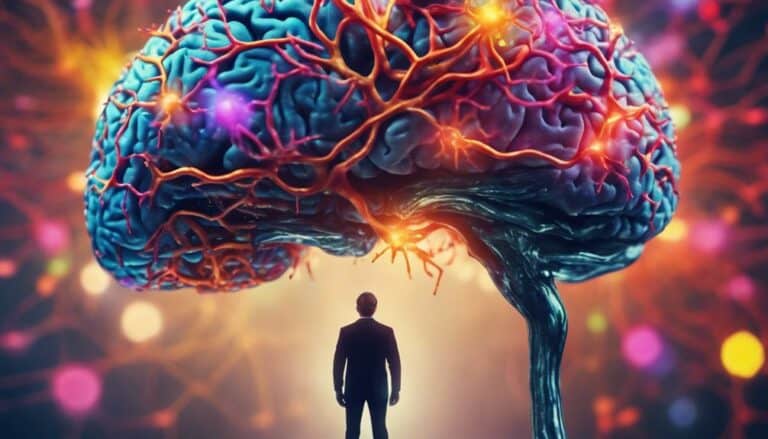You may be surprised to discover how your brain responds to pornography consumption.
Dr. Huberman's insights on quitting porn delve into the intricate workings of our neural pathways and the impact of extreme stimuli on our everyday lives.
Understanding the neuroscience behind porn addiction can provide you with a new perspective on your habits and empower you to make informed decisions about your well-being.
Stay tuned to explore practical strategies for rewiring your brain and breaking free from the cycle of porn consumption.
Key Takeaways
- Recognize triggers and eliminate temptations for proactive recovery.
- Develop positive addictions and joy-inducing activities for healthier patterns.
- Foster healthy coping mechanisms to rewire the brain away from porn.
- Engage in fulfilling hobbies and social interactions to create new neural pathways.
Understanding Porn Addiction From a Neuroscience Perspective
Understanding porn addiction from a neuroscience perspective reveals how early exposure to porn shapes addictive behaviors in the brain, altering dopamine pathways and hijacking reward centers. Your brain, especially the frontal lobe and reward center receptors, becomes wired to seek out porn for the dopamine release it provides. This constant flood of dopamine can lead to brain hijacking, where addiction mechanisms take over, making it challenging to resist the urge to consume more porn.
Moreover, porn addiction isn't solely about sexual satisfaction but also about mood regulation. Stressful triggers can prompt your brain to seek out porn as a coping mechanism, further perpetuating the addiction cycle. By understanding these neural processes, you can begin to see how porn addiction is deeply ingrained in the brain's chemistry and functioning, making it crucial to address the root causes of the addiction to break free from its grip.
To quit porn successfully, it's essential to recognize how your brain responds to porn, how dopamine levels are affected, and how the addiction cycle influences your behaviors. By delving into the neuroscience perspective of porn addiction, you can gain valuable insights into overcoming this challenging addiction.
The Role of Dopamine in Porn Addiction
During the consumption of porn, dopamine release in the brain triggers feelings of pleasure and reinforces addictive behaviors. This neurotransmitter, associated with motivation and reward, plays a crucial role in the development of sexual addiction.
Habituation to pornography can lead to a decrease in dopamine receptors, necessitating exposure to more extreme forms of content to achieve the same level of pleasure. The compulsive cycle of seeking out porn for gratification is largely driven by the dopamine system.
Excessive viewing of porn can disrupt the normal regulation of dopamine levels, contributing to the establishment and perpetuation of addiction. Understanding the neurobiological aspects of how dopamine functions in the context of porn addiction is essential for addressing the addictive cycle and promoting successful addiction recovery.
Breaking the Cycle of Porn Consumption
Breaking the cycle of porn consumption requires identifying and eliminating triggers that fuel addictive behaviors. Here are three essential steps to help you in this process:
- Recognize Your Triggers: Whether it's a specific time of day, a particular location, or emotional states like stress or loneliness, pinpointing what triggers your urge to consume porn is the first step in breaking the cycle of addiction.
- Eliminate Temptations: Get rid of saved files, unsubscribe from explicit content, and create a trigger-free environment. By removing sources of temptation, you can significantly reduce the likelihood of relapse and support your long-term recovery from porn addiction.
- Develop Positive Addictions: Engage in activities that bring you joy and fulfillment, such as pursuing hobbies, exercising, or learning new skills. By replacing the habit of porn consumption with positive addictions, you can rewire your brain and establish healthier patterns of behavior, aiding in overcoming addiction.
Neuroscientific Techniques for Overcoming Porn Addiction
Utilizing neuroscientific insights, individuals combating porn addiction can harness a deeper understanding of their brain's response mechanisms to facilitate effective recovery strategies.
Internet Porn's addictive nature significantly affects the brain, with dopamine release during viewing triggering the reward system and fostering compulsive behavior. To overcome porn addiction, recognizing and eliminating triggers that prompt porn consumption is vital. By identifying these triggers, individuals can take proactive steps to avoid situations that may lead to relapse.
Developing healthy coping mechanisms to regulate mood and reduce the reliance on porn is essential in breaking free from its grip. Seeking help and creating a supportive environment free from triggers can aid in long-term recovery. Understanding the negative consequences of excessive porn consumption on the brain's reward circuitry is crucial for those in need of assistance.
Rewiring Your Brain Away From Porn
To rewire your brain away from porn, engage in positive activities that create new neural pathways to replace the reward response associated with pornography. Breaking the habit loop that triggers the urge to watch is crucial in overcoming addiction.
Here are three key points to aid in this rewiring process:
- Engage in Positive Activities: Redirect your focus towards fulfilling hobbies, exercise, social interactions, or creative pursuits. By actively participating in positive behaviors, you can replace the neural connections that reinforce the habit of watching porn.
- Identify and Eliminate Triggers: Understand the specific cues or situations that lead you to watch porn. Once identified, work on removing or avoiding these triggers to weaken the association between them and the urge to consume porn.
- Seek Healthy Dopamine Release: Find alternative ways to release dopamine naturally, such as through exercise, meditation, or pursuing personal goals. By fostering healthy coping mechanisms, you can reduce the reliance on porn for dopamine satisfaction and support your brain rewiring efforts.
Conclusion
In conclusion, breaking free from porn addiction requires rewiring your brain and understanding the neurobiological effects of pornography consumption. By utilizing neuroscientific techniques and actively working to break the cycle of porn consumption, you can take control of your arousal responses and create healthier habits.
But the question remains: are you ready to make the necessary changes to overcome this addiction and improve your overall well-being?

